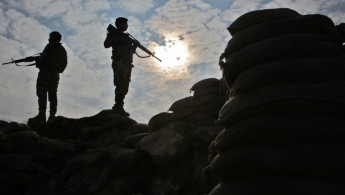Iraq constructs security wall along border with Syria to thwart ISIS infiltration
Iraq continues to fortify its western and northern borders with Syria by building a security fence aimed at preventing all infiltrations by the Islamic State militants, other militias, and drug gangs from the Syrian territories into Iraq. Iraqi officials expect the fortifications to be completed by the end of this year.
In 2018, Iraq began the construction of the 160-kilometre-long security wall adjacent to the Anbar and Ninawa governorates, which still witness infiltrations and drug smuggling activities from the Syrian territories.
"The operations to secure the western and northern international borders with Syria will continue until the end of this year. The security measures include a security wall, tunnels, and a series of fortifications to prevent all infiltration operations from Syrian territories into Iraq," the spokesperson for the Iraqi Joint Operations Command, Major General Tahsin al-Khafaji, on Tuesday told Al-Araby Al-Jadeed, The New Arab's Arabic language sister publication.
Al-Khafaji affirmed that Iraq would complete the fortification and security operations at the borders by the end of the current year.
"Securing the borders with Syria includes building a cement wall, digging trenches with a width and depth of 3 meters, in addition to laying barbed wire and establishing observation towers, and deploying border guard units and behind them units of the Iraqi army," noting that this is to ensure preventing any infiltration or penetration of ISIS militants to the borders from the Syrian side, as well as controlling organized crime and smuggling operations.
He indicated that the Iraqi Ministries of Defense and Interior, through the Joint Operations Command, continue to construct concrete barriers on the border strip from the northwest in Ninawa Governorate, specifically in the towns of Rabia and Sinjar, opposite Al-Hasakah Governorate in Syria. The barriers are currently placed in the most complex and rugged areas, extending from the Fishkhabour crossing to the Gilbarat area.
The Islamic State group declared a self-styled caliphate in a large swath of territory in Syria and Iraq that it seized in 2014. It was declared defeated in Iraq in 2017 following a three-year battle that left tens of thousands of people dead and cities in ruins. The group was defeated in Syria, losing its last sliver of land in 2019, but its sleeper cells remain in both countries.
Military expert, analyst, and researcher at the Rassam Center for Studies Hatem Al-Filahi ruled out complete security control over the border strip between Iraq and Syria.
He said that the border strip between Iraq and Syria is unlikely to achieve complete security control due to its length, exceeding 600 kilometres, and the limitations of Iraqi border guard forces. Threats come not only from ISIS but also from the PKK and armed factions with ties to Iran, making comprehensive border control challenging.
The Iraqi-Syrian borders witnessed over the past two decades infiltration operations by armed groups, including Al-Qaeda and ISIS, as well as smuggling and seizure operations by various armed groups along the border areas with Iraq.




 Follow the Middle East's top stories in English at The New Arab on Google News
Follow the Middle East's top stories in English at The New Arab on Google News


